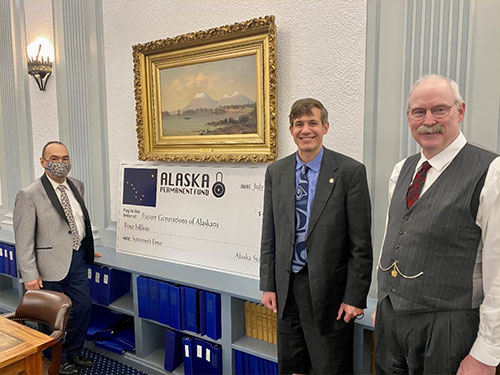Senate Finance Committee colleagues Sens. Donny Olson, Bill Wielechowsk, and Bert Stedman after their first committee meeting of the session. |
Senator Bill Wielechowsk (D-District H-Anchorage) made the top of the list by providing detailed information about the 2022 legislative session. He also provided comments on items of consideration in his Jan. 19th newsletter.
Alaska Budget
This session Sen. Wielechowski will again serve as a member of the Senate Finance Committee. This committee is responsible for the state's annual budget and every bill that affects the finances of the state. Creating a responsible budget is vital this year and many other important pieces of legislation will be heard by this committee.
Wielechowski explained in his newsletter that under Alaska law, the governor is responsible for proposing a budget for the next fiscal year, which begins July 1, for the operations of the state government departments. Because the Alaska Legislature is constitutionally authorized with the appropriations power, the budget must be proposed for consideration by the legislature each year ahead of the legislative session. The governor released his fiscal year 2023 proposed budget on December 15th.
Wielechowski stated in the newletter that despite attempting significant budget cuts in the past, the governor's proposed budget would require a withdrawal of nearly $1.7 billion from the earnings account of the Permanent Fund to spend on government.
Wielechowski wrote, "I have long argued that to pay for state services and projects, I believe we should cut back on the massive tax breaks we give the oil industry – currently about $1.3 billion per year - and not cut the people’s PFDs. Our oil and gas reserves are finite and each year that passes without fixing our broken tax system, we miss another chance to ensure the people receive their constitutionally mandated maximum benefit from the resources we all collectively own."
Wielechowski wrote, "Under the PFD statute enacted in 1982 and adhered to for decades until 2016, last year’s PFD would have been about $3,870. Instead, Alaskans received a PFD of less than 1/3 of the statutory PFD, at $1,114. This year, the statutory formula would yield a PFD of $4,200. In his FY23 budget, the governor has called for a PFD of $2,564 for each qualified Alaskan—and it remains to be seen what the people will receive when the legislature and governor have completed this session’s budget cycle."
"At face value the governor’s proposed budget appears to balance out. However, his plan also replaces state funding with $375 million in federal Covid-19 relief aid. This federal money is a limited funding source that will not be available for use by the state in future years. This means that, in reality—despite using the Permanent Fund earnings and reductions to the statutory PFD—there will be a budget shortfall of at least $375 million in future years," wrote Sen. Wielechowski .
"This is a time when Alaskans should be receiving their maximum PFD. The pandemic over nearly the last two years has hit Alaska’s most vulnerable families in the worst possible way. From missed work due to mandatory business shutdowns, for COVID infections, or simply due to repeated close contact exposure, and taking care of impacted loved ones, or having to pivot to remote learning for their children, and with supply chain problems causing skyrocketing prices of basic needs like groceries and household goods, as well as market conditions and harsh winter weather causing significant increased costs to energy bills for heating and electricity—the pandemic period has tested Alaskans’ physical and emotional health as well as their pocketbooks. At this unprecedented time especially, I would not recommend cuts to Alaskans’ PFDs this year," wrote Wielechowski .
Wielechowski wrote in his newsletter, "Governor Dunleavy's proposed funding of $199 million for oil tax cash credits far exceeds the statutorily recommended amount, and should receive close scrutiny. The 2006 statute enabling payment of the cash credits to the oil companies is completely discretionary—meaning they legally need NOT be paid at all."
Senator Bill Wielechowsk (D-District H-Anchorage) provided detailed information about the 2022 legislative session and his comments in his most recent newsletter on Jan. 19th. One that retirees may find of interest is SJR 12 sponsored by Senators Wielechowsk, Kiehl, Kawasaki, and Gray-Jackson.
Repeal of the Windfall Elimination Provision (WEP) and Government Pension Offset (GPO) of the Social Security Act.
SJR 12 is summary is urging the United States Congress’s Repeal of the Windfall Elimination Provision (WEP) and Government Pension Offset (GPO) of the Social Security Act. The Windfall Elimination Provision (WEP) cuts the Social Security benefits of public employees in Alaska if they switch between work in the public sector and private sector or the military. In 2021, this loss could have been as much as $498 per month, or about $6,000 a year. This simply means that a person's earned social security benefits is reduced because of the amount of their penions earned as a public employee.
The Government Pension Offset (GPO) also cuts spousal or widows’ benefits for public employees for no reason other than their work time in the public sector. This cut could amount to as much as 2/3rds the value of the individual’s government pension. (Read the full text of SJR 12, click here.)
K-12 education funding
Rep. Andi Story (D-Juneau) stated in a news release, that six years of loss, due to flat education funding and inflation, would be reversed under a series of bill introduced on the House Floor by him on Jan. 18th. Thise bills would increase the per-pupil amount school districts receive from the state. The Base Student Allocation (BSA) for grades K-12 has not been increased since FY2017. In that period, Story wrote that Alaska has experienced a rise in inflation of 11.6%.
"When school districts lose ground financially, it hurts kids through growing class sizes and fewer critical services, such as counselors and nurses. We have a collective responsibility to families and to Alaska's economy to ensure strong schools," said Rep. Story. "The best way to attract new residents, build a skilled workforce, and maintain a strong economy, is to assure Alaskans a quality education, pre-school through post-secondary."
HB 272 would increase the BSA in FY23 and again in FY24. This allows for districts to address their operational costs and plan with some certainty to meet student needs. Currently, many districts’ budgets are due to their municipalities before they know their revenue. This would also eliminate the need to “pink slip” valuable staff.
HB 273 would add inflation proofing to the BSA formula beginning in FY25 for all years going forward. This would be based on the Consumer Price Index for Urban Alaska, ensuring that education’s growth is directly tied to Alaska’s growth.
Both bills were read across the floor on the first day of session, January 18th, and were referred to the House Education and Finance committees.
Public Safety Legislation
Representative Geran Tarr (D-Anchorage) had companion bills for the six-part public safety policy change package submitted last year by Senator Elvi Gray-Jackson (D-Anchorage) read across the floor on Jan. 18th. House Bills 253-256 are intended to build community trust with law enforcement by increasing transparency and accountability of Alaska’s law enforcement agencies and modernize police procedures to require de-escalation when using force against an individual. House Bills 269 and 270 would limit specific uses of reckless and excessive force. The suite of bills was also co-sponsored by Representative Harriet Drummond (D-Anchorage).
Tarr's news release stated these police reform bills include reforms being considered across the nation that have been enacted in the wake of the 2020 killing of George Floyd, pulling from movements such as “8 Can’t Wait.” HB 254 includes some of these policies, such as adding de-escalation and non-lethal methods of engagement before using lethal force, as well as adding an oral warning before discharging a firearm.
HB 253, 255 and 256 are intended to increase transparency by requiring the reporting of police misconduct and use of force and requiring use-of-force policies to be posted publicly online.
HB 269 would ban the use of carotid restraints and HB 270 would limit police officers from shooting at moving vehicles. Together, this suite of bills attempts to decrease unnecessary use of force by our law enforcement officials, as well as reducing the opaque nature of the police accountability process.
“We have hardworking and dedicated public safety professionals across our state doing some of the hardest work in public service. I commend and thank them. At the same time, we have challenges with trust, transparency, and accountability that, if addressed and improved, will improve public safety in our communities and make policing safer for our officers,” said Representative Tarr. “We don’t minimize the risks that our law enforcement officers take in order to keep the peace. However, we believe use of lethal force should be considered as the last option after a de-escalation process, especially when dealing with unarmed individuals. Beyond these measures, we have additional work to do to address community public safety with social services and I am committed to this work too.”
“Alaska’s law enforcement officers work tirelessly to ensure the overall safety of our beloved community. I understand that in order to ensure a safe community, officers oftentimes put their own lives on the line. The selflessness of our officers shouldn’t go unnoticed or unappreciated. This is one of the reasons that I worked so diligently to include various law enforcement agencies in the entire legislative process of my various public safety policy change bills,” said Senator Gray-Jackson. “Although Alaska’s officers are part of the nations’ best, we understand that there is always room for improvement. I want to ensure that each time an officer enters the field, that they are equipped with all the tools they need to adequately protect themselves and the individuals they may encounter. My series of bills address longstanding issues surrounding public safety policy within the state. I am very appreciative to the countless persons who serve our community as law enforcement officers.”
"Through my work on the school board with the school resource officers, to working directly with Anchorage police while on the assembly, to my time here in the legislature, I know that we have some of the nation’s finest law enforcement professionals that bravely serve our communities," said Representative Drummond. "I am signing on to this package of legislation because we can always improve—and should—to address concerns brought by the public.
Several organizations have supported this suite of bills, including the Anchorage and Fairbanks chapters of the NAACP, the Alaska Black Caucus, the First Alaskans Institute, and more.
Public Safety: Safe Heating Systems
Rep. Chris Tuck (D-Anchorage) and Sen. Mia Costello (R-Anchorage) announced on Jan. 21st, they filed public safety legislation to help ensure that many of the heating systems used to warm buildings in Alaska are safe and in good working order.
House Bill 218 and Senate Bill 169 filed by Tuck and Costello would require the periodic inspection and testing of fire dampers, smoke dampers, and smoke control systems in Alaska by trained professionals. Currently, fire safety equipment like sprinkler systems, fire alarms, and fire extinguishers are periodically inspected. However, other components like fire dampers, smoke dampers, and smoke control systems are not clearly subject to inspection and testing requirements.
“My goal with House Bill 218 is to align Alaska law and regulations with the standards of the National Fire Protection Association. Following these standards is important to protect public safety because it takes specialized training to properly inspect and maintain the fire life safety components in many heating and ventilation systems. The successful operation of this equipment can be the difference between life and death and between a minor fire and an uncontrolled catastrophe,” said Rep. Tuck.
House Bill 218 requires fire and smoke dampers to be inspected one year after being installed and every four years thereafter, except in hospitals, which have a six-year inspection frequency. Dedicated smoke control systems would need to be inspected every six months and non-dedicated smoke control systems would need to be inspected annually. Additionally, HB 218 defines the certification requirements needed to test and inspect fire dampers, smoke dampers, and smoke control systems within heating, ventilation, and air conditioning (HVAC) systems.
“As a result of Alaska’s cold climate, nearly every commercial, industrial, and public building must be heated. The goal of Senate Bill 169 is to ensure that the fire life safety components that are part of the HVAC systems in these buildings are functioning as designed. SB 169 is a public safety bill that will protect Alaskans,” said Sen. Mia Costello.
House Bill 218 has been referred to the House State Affairs Committee and the House Finance Committee. Senate Bill 169 has been referred to the Senate Health and Social Services Committee and the Senate Finance Committee.
And coming around to Ketchikan's district representative's newsletter, Rep. Dan Ortiz (Not Affiliated - Ketchikan) announced in his Jan. 19th public newsletter, his primary focus this year will be the budget and working towards a long-term sustainable fiscal plan. He also announced he is also carrying two pieces of legislation:
House Bill 31, Observe Daylight Saving Time All Year - this bill would allow Alaska to stay on Daylight Saving Time all year round if approved by the Federal government. We would no longer 'fall back' and would be only three hours time difference from the East Coast during half of the year.
House Bill 41, Shellfish Projects - this bill would create regulations within the Alaska Department of Fish & Game to allow qualified non-profits to pursue enhancement and restoration projects for species like red and blue king crab, sea cucumber, abalone, and razor clams.
Rep. Ortiz is co-chair of the House Finance Committee. He made no public comments in his newletter about exactly what his focus on the governor's proposed budget will be nor how he intends to work towards a long-term sustainable fiscal plan. His public comments in his newsletter were strictly political wordage and vague. (Link to Ortiz's public newsletters)
Other sponsored and co-sponsored bills by Ortiz can be found online, click here. Ortiz's voting record can be found online, click here.
Links of Interest:
List of first prefiled bills for consideration (pdf)
List of second prefiled billls for consideration (pdf)
Alaska House & Senate Scheduled Meetings
http://w3.akleg.gov/index.php#tab4House Transportation Committee
http://www.akleg.gov/basis/Committee/Details/32?code=HTRA#tab1_7House Transportation Meetings
http://www.akleg.gov/basis/Committee/Details/32?code=HTRA#tab2_7Sen. Bert Stedman - Committee Memberships
http://www.akleg.gov/basis/Member/Detail/32?code=smn#tab7_2Sen. Stedman's voting record
http://www.akleg.gov/basis/Member/Detail/32?code=smn#tab7_4House Finance Meetings
http://www.akleg.gov/basis/Committee/Details/32?code=HFIN#tab2_7Rep. Dan Ortiz's Committee Memberships
http://www.akleg.gov/basis/Member/Detail/32?code=ort#tab7_2
Source of News:
Senate Democrat Newsletters
aksenatedems.com/newsletters/Alaska State Senate
http://akleg.gov/senate.phpAlaska House of Represenatives
http://akleg.gov/house.php
Representations of fact and opinions in comments posted are solely those of the individual posters and do not represent the opinions of Sitnews.
Send a letter to the editor@sitnews.us
SitNews ©2022
Stories In The News
Ketchikan, Alaska
Articles & photographs that appear in SitNews are considered protected by copyright and may not be reprinted without written permission from and payment of any required fees to the proper freelance writers and subscription services.
E-mail your news & photos to editor@sitnews.us
Photographers choosing to submit photographs for publication to SitNews are in doing so granting their permission for publication and for archiving. SitNews does not sell photographs. All requests for purchasing a photograph will be emailed to the photographer.




